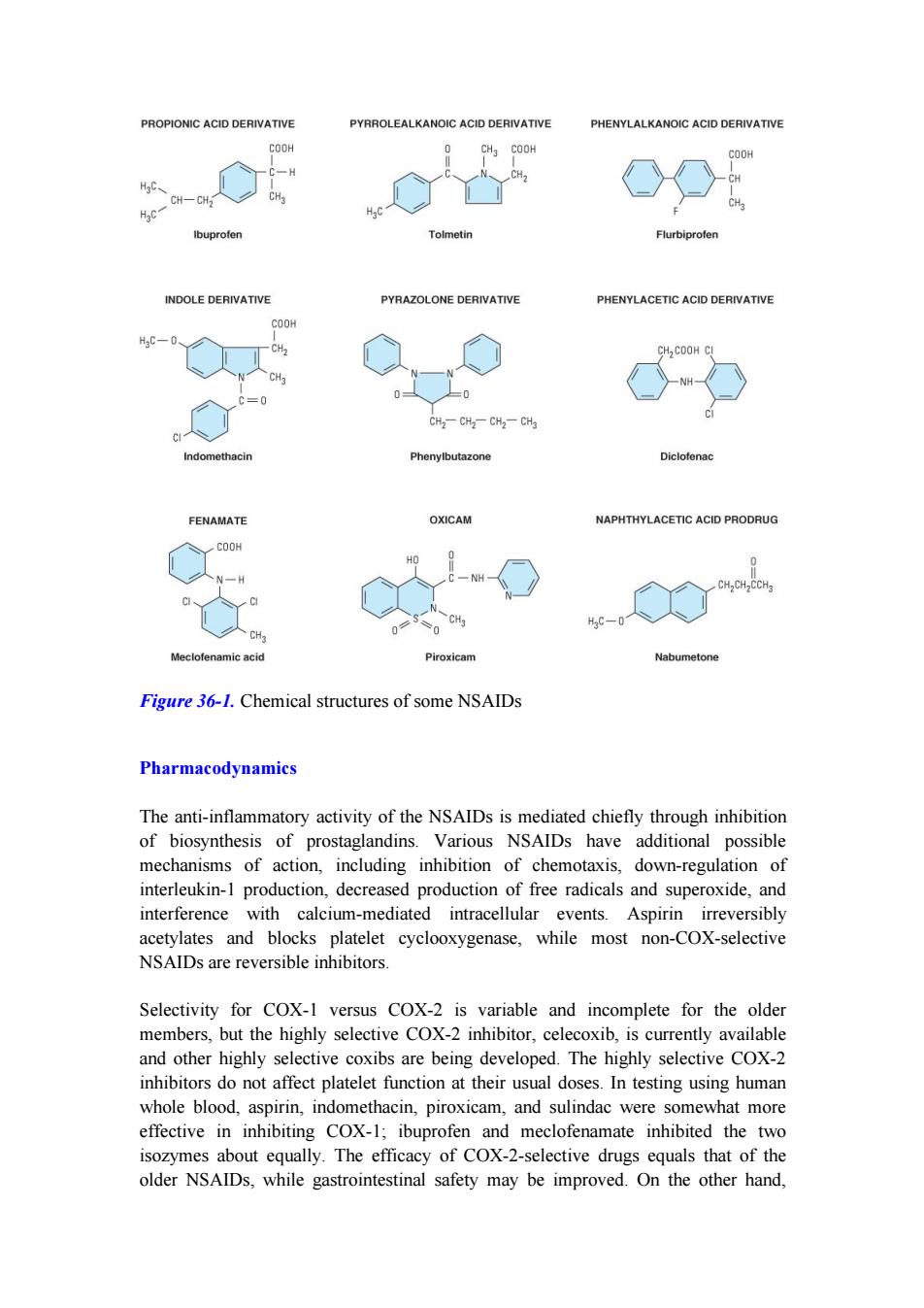正在加载图片...

PROPIONIC ACID DERIVATIVE PYRROLEALKANOIC ACID DERIVATIVE PHENYLALKANOIC ACID DERIVATIVE COOH CH3 COOH COOH CH HgC、 CH-CH CH 作c CH Ibuprofen Tolmetin Flurbiprofen INDOLE DERIVATIVE PYRAZOLONE DERIVATIVE PHENYLACETIC ACID DERIVATIVE COOH H3C-0 CH2 CH COOH CI CH2-CH2-CH2-CHa CI Indomethacin Phenylbutazone Diclofenac FENAMATE OXICAM NAPHTHYLACETIC ACID PRODRUG COOH N-H CH,CH CCH3 HaC-0 Meclofenamic acid Piroxicam Nabumetone Figure 36-1.Chemical structures of some NSAIDs Pharmacodynamics The anti-inflammatory activity of the NSAIDs is mediated chiefly through inhibition of biosynthesis of prostaglandins.Various NSAIDs have additional possible mechanisms of action,including inhibition of chemotaxis,down-regulation of interleukin-1 production,decreased production of free radicals and superoxide,and interference with calcium-mediated intracellular events.Aspirin irreversibly acetylates and blocks platelet cyclooxygenase,while most non-COX-selective NSAIDs are reversible inhibitors. Selectivity for COX-1 versus COX-2 is variable and incomplete for the older members,but the highly selective COX-2 inhibitor,celecoxib,is currently available and other highly selective coxibs are being developed.The highly selective COX-2 inhibitors do not affect platelet function at their usual doses.In testing using human whole blood,aspirin,indomethacin,piroxicam,and sulindac were somewhat more effective in inhibiting COX-1;ibuprofen and meclofenamate inhibited the two isozymes about equally.The efficacy of COX-2-selective drugs equals that of the older NSAIDs,while gastrointestinal safety may be improved.On the other hand,Figure 36-1. Chemical structures of some NSAIDs Pharmacodynamics The anti-inflammatory activity of the NSAIDs is mediated chiefly through inhibition of biosynthesis of prostaglandins. Various NSAIDs have additional possible mechanisms of action, including inhibition of chemotaxis, down-regulation of interleukin-1 production, decreased production of free radicals and superoxide, and interference with calcium-mediated intracellular events. Aspirin irreversibly acetylates and blocks platelet cyclooxygenase, while most non-COX-selective NSAIDs are reversible inhibitors. Selectivity for COX-1 versus COX-2 is variable and incomplete for the older members, but the highly selective COX-2 inhibitor, celecoxib, is currently available and other highly selective coxibs are being developed. The highly selective COX-2 inhibitors do not affect platelet function at their usual doses. In testing using human whole blood, aspirin, indomethacin, piroxicam, and sulindac were somewhat more effective in inhibiting COX-1; ibuprofen and meclofenamate inhibited the two isozymes about equally. The efficacy of COX-2-selective drugs equals that of the older NSAIDs, while gastrointestinal safety may be improved. On the other hand